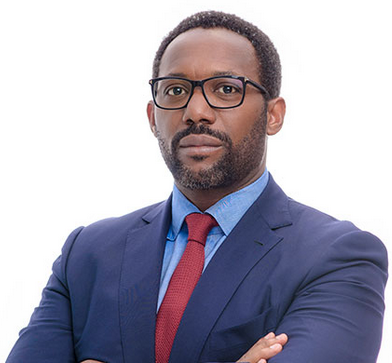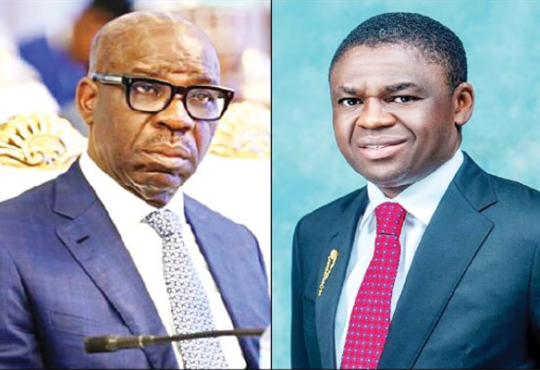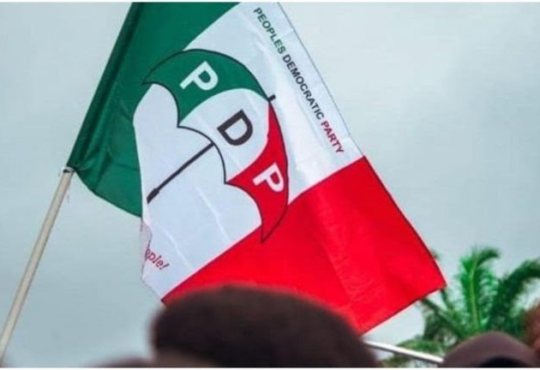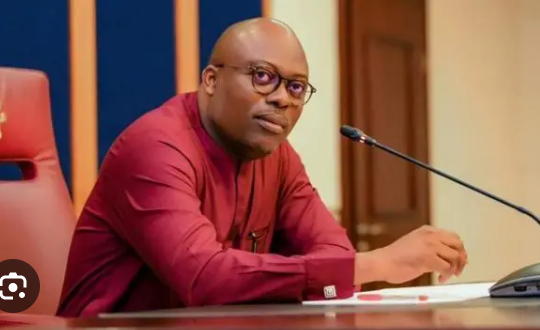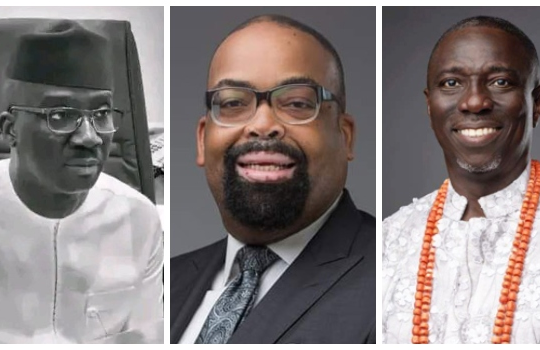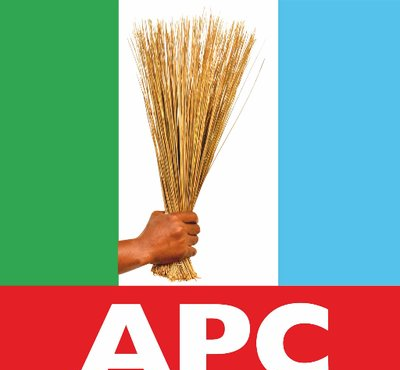
ABDULRAHMAN ZAKARIYAU writes on the Peoples Democratic Party’s perpetual quest for peace and how continuous internal discord hampers the party’s efforts to rebound and restructure in preparation for the 2027 elections
From the build-up to the aftermath of the 2023 election, the primary opposition political entity, the People’s Democratic Party, has been mired in internal turmoil marked by leadership disputes, suspensions, and legal battles. Tranquility reigned within the PDP until the 17 presidential hopefuls of 2023 started voicing their intentions and pursuing their agendas, sparking internal discord within the primary opposition party.
Matters intensified when the former governor of Rivers State and Minister of the Federal Capital Territory, Nyesom Wike, was defeated by the former Vice President, Atiku Abubakar in the party’s presidential primary in 2022.
The situation in the party took a fresh dimension when Atiku announced former Delta State governor, Ifeanyi Okowa, as his running mate for the recent presidential election, going against the recommendation of ex-governor of Benue State, Samuel Ortom, and other influential figures who favoured Wike as the PDP’s vice presidential candidate.
As a result, the party splintered into two factions; the Wike G5 group and Atiku’s group, each pursuing its objectives. The G5 faction insisted on the resignation of the currently suspended PDP National Chairman, Iyorchia Ayu, as a condition for supporting Atiku in the 2023 presidential election.
However, Atiku’s faction rejected this demand and instead reluctantly accepted the resignation of the Board of Trustees Chairman, Senator Walid Jibrin. Wike’s faction also opposed this decision and conducted several press conferences, divulging information that further tarnished the already tarnished reputation of both the party and the PDP’s 2023 presidential candidate.
While other political parties were gearing up for the elections, the conflict between Wike and Atiku dominated discussions within the PDP. This resulted in conflicting strategies during the election, ultimately leading to its (PDP) defeat against President Bola Tinubu’s All Progressives Congress. Efforts to unite both factions ahead of the presidential election hit a roadblock, as the Atiku and Wike camps refused appeals from party leaders and members to mend their differences.
After the election, tensions between the Atiku and Wike factions escalated, leading to the suspension of some members and legal action taken against the party by others. The crisis peaked when Ayu was ordered by Justice W. I. Kpochi of the Benue State High Court to cease acting as the party’s chairman.
In the interim, the National Working Committee, by the court ruling and the party’s 2017 constitution as amended, appointed Ambassador Umar Damagum, the Deputy National Chairman (North), as the acting national chairman of the party. Damagum, who sought to maintain neutrality, also faced significant challenges in stabilising the PDP. The conflict between the Wike and Atiku factions has deeply impacted all facets of the party, including the NWC, PDP Governors’ Forum, National Executive Council, BoT, and others.
These obstacles, among others, have impeded the PDP’s capacity to present a cohesive stance on national issues. Additionally, the recent 98th NEC meeting was fraught with tension as the Atiku and Wike factions vied for dominance, failing to address key issues crucial for the party’s future direction.
Regarding these national issues, numerous state party chapters are also grappling with crises. In Kaduna State, disagreements involve former Vice President Namadi Sambo, ex-governor, Ahmed Makarfi, and the 2023 governorship candidate, Isah Ashiru. Similarly, internal conflicts plague Kano and Yobe state chapters of the party.
In the North-Central, the PDP chapter in Niger State is striving to reclaim its influence. Internal discord in Plateau State nearly resulted in the party losing its governorship position in court. Prolonged internal disputes have left the PDP seemingly inactive in Kogi and Kwara states.
The North-East region faces its challenges, with chapters in Borno, Yobe, Bauchi, and Gombe encountering obstacles. Members and stakeholders from these states impede the party’s progress due to their vested interests.
In the South-West, Governors Seyi Makinde of Oyo and Ademola Adeleke of Osun have succeeded in stabilising the party in their respective states. However, Ekiti, Ondo, Lagos, and Ogun states are experiencing significant crises.
In the South-East, aside from the recent disagreement over the position of PDP National Secretary, which sparked a conflict among party leaders, chapters in the five states of the zone are embroiled in internal strife and numerous legal battles. On Tuesday, former Imo State governor, Emeka Ihedioha, and 11 others resigned from the party.
Explaining why he dumped the PDP after 26 years of membership, he said, “Regrettably, in recent times, the party has taken a path that is at variance with my personal beliefs. Despite my attempts to offer counsel, the party is, sadly, no longer able to carry out internal reforms, enforce its own rules, or offer credible opposition to the ruling All Progressives Congress.
“It is in the light of the foregoing, that I am compelled to offer my resignation from the Peoples Democratic Party effective immediately. While the decision was difficult to take, I, however, believe that it is the right one,” he added.
Due to the prolonged internal crisis, the PDP is gradually losing ground in the South-East to former Anambra State governor, Peter Obi’s Labour Party.
The PDP chapters in the South-South have recently faced negative publicity. The crisis between Wike and Rivers State Governor, Sim Fubara, has destabilised the PDP, along with the defection of 27 state House of Assembly members from the PDP to the APC. Many party leaders are also defecting from the PDP to the APC and other parties. In Cross River and Edo states, the PDP is mired in internal conflicts.
Amidst all these challenges, the PDP continues to grapple with numerous legal battles with no end in sight. The Legal Adviser of the PDP, Kamaldeen Ajibade, stated that the party was currently facing multiple court cases.
A Senior Advocate of Nigeria, in a telephone interview with Saturday PUNCH, urged party members to exhaust the party’s internal conflict resolution mechanisms before resorting to court.
The SAN, who does not want his name mentioned because of the sensitive nature of the issues affecting the PDP, stated, “It is part of our constitution; it has always been part of the founding principles of the party that internal mechanism should be explored before going to court. Taking the party to court without exploring the internal conflict resolution mechanism is an offence.
“We have a record of cases in court. We have cases that are on internal issues aside from election and pre-election matters in all courts; Federal High Court to Supreme Court.”
Damagum, discussing his leadership approach recently, clarified that the party prioritised reconciliation and attracting more individuals into the party over penalising anyone for alleged anti-party activities, which, in his view, could harm the party.
He said, “They are always telling you these people are not doing the right thing. But when you are in a position of leadership, you are bound by a set of rules, and these rules, even though they are itching you, you don’t apply them; not because of anything, but so that you don’t destroy the house.”
The acting PDP national chairman added, “I am very proud to say that this party was started by me as a driver. Today, I am the acting national chairman by the grace of God. I have never calculated that I will be given this title. I believe in this party; I believe that this party is the best in this country.
Damagum, who admitted that many members were involved in anti-party activities at different levels, said, “If I say we should start suspension, I will end up suspending many people because they were involved in anti-party activities. So, please bear with us. We intend to keep this party together and to manage it. This is my mandate.
“When a substantive chairman comes, he can decide to suspend or dismiss anybody. But myself as somebody who loves this party, somebody who started this party, I think we need even those from the other side to come back and join.”
As Damagum leads the NWC of the PDP, the delay in making crucial decisions to address internal crises is a cause for concern. Political analysts worry that the party may lose members to the APC and the LP, and potentially diminish its influence in future Nigerian elections.
‘Crisis may consume PDP’
Political analyst, Jide Ojo, and former national chairman of the National Democratic Party, Chudi Chukwuani, cautioned that the internal crisis currently plaguing the PDP might engulf the party if genuine efforts were not made to reconcile all aggrieved members.
In an interview with our correspondent, Ojo said, “The internal crisis may consume the PDP if not urgently addressed. In politics, the only permanent thing is interest. Part of the crisis is because there’s no peaceful transition from one NWC to another; you have people who were either removed or resigned.
“The PDP is still the main opposition party considering the number of states under its control, 13 out of 36. APC has 20; then you have the New Nigeria People’s Party, All Progressives Grand Alliance, and LP having one under their control. So, in terms of structure and size, you will give it to the PDP as being the main opposition party, but the PDP is plagued with internal crisis.”
Ojo wondered why the party won’t be in crisis, saying, “It has been over one year since Ayu was removed. They still have an acting chairman. So, the NWC has not been able to perform at an optimal level. The internal crisis is affecting the growth of the PDP. So, there is an urgent need for the party to reconcile. The general election has been over since February, March 2023. Why couldn’t the PDP have a convention and appoint or elect a substantive chairman? There is an urgent need for the Damagum-led NWC to be active and be seen working towards genuine reconciliation. The NWC also needs to liaise with the 13 PDP governors to see how they can move the party forward.
“The PDP can choose to be different by the way they go about their task or responsibility. In their respective states under their control, at the leadership level in Abuja; how united are they? For them to be able to engage constructively with the ruling party, there are many distractions. The party needs to do things professionally so that when they organise party primaries, they are without rancour and contention. Due process is followed. When they go on campaigns they are united. Where there is a crisis, they reconcile because there is no political party without internal wrongdoings. So, having a leadership crisis is not unique to any party. Almost all the parties are involved. But how the party will emerge from that crisis and how it will manage it is very key.”
In an interview with our correspondent, Chukwuani told Saturday PUNCH that being plagued with a crisis would not make the PDP credible, adding that nobody would want to invest in the PDP because of the crisis. The political analyst urged the PDP to get the party leadership right for Nigerians to enable them to perform effectively as an opposition party.
He stated, “Yes, of course, when a party is in crisis, that party normally does not succeed. The party that succeeds is the party that can manage its affairs, avoid crises, and be united before elections. You need that unity to get the best of your political class along with you for elective offices and to come along with you and invest in you. Nobody will invest in a crisis-driven political party; that would amount to a waste of your time, energy, or money.
“So when a party is in crisis, it doesn’t augur well at all. And nobody will take the PDP seriously; the party cannot mount an effective opposition. The PDP can best be described as an empty shell divided into pieces. To reposition itself, the PDP has to put in place intact leadership; a party without a leader is no party. So, the leadership has to be put in place as quickly as possible. The leadership has to work together and be united. When they have that united leadership, then the PDP can build up all the other structures of the party.”
Reconciliation ongoing – Scribe
Reacting, the PDP National Publicity Secretary, Debo Ologunagba, who confirmed that the party was grappling with an internal crisis, revealed that reconciliation efforts were ongoing. Ologunagba explained, “Human organisation is not in a straitjacket. Some dynamics happen. As a party, we believe that even if we have issues before the election, we must continue to accommodate each other.”
He continued, “There are issues, but reconciliation is ongoing. As I always say, there are issues even in a family setting. There are issues in the PDP, but reconciliation in a human organisation like our party is constant because every step cannot meet the taste of everyone at the same time. So, reconciliation is ongoing.
“On a final note, I want to remind you that this party relies on its constitution, and we will obey it to the letter. I can tell you that this party is focused. We will lead the charge to sustain this democracy to ensure that we have a true federal system where fairness and equity, human resources, and management of the affairs of the nation exist; that is our vision. People come to parties and go. The PDP will remain strong and united to rescue and rebuild Nigeria.”
Meanwhile, one of the most notable outcomes from the 98th NEC gathering, which holds potential advantages for the PDP, is the establishment of committees focused on reconciliation, disciplinary actions, and constitutional amendments.
At the meeting, the NEC designated former Senate President, Abubakar Saraki, as the head of the Reconciliation Committee, former governor of Akwa Ibom State, Udoh Emmanuel, as the chair of the Disciplinary Committee, and the PDP Legal Adviser, Kamaldeen Ajibade, SAN, as the leader of the Constitution Amendment Committee.
Political pundits commended the NEC for these appointments, emphasising that while reconciliation and disciplining of errant leaders were crucial for promoting party supremacy, amending the party’s constitution could prevent the recurrence of many crises plaguing the party.
As a result, political observers hold the view that individuals appointed to these committees by the party, along with the approach they take in carrying out their duties, will dictate whether the party achieves the peace it desires or continues to struggle with crises that could lead to its downfall or extinction.


